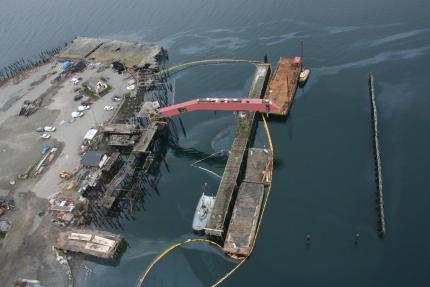To report an oil spill (24/7), call the Emergency Management Division at 800-258-5990.
To report oiled wildlife during business hours, call the oiled wildlife reporting hotline at 800-22-BIRDS (800-222-4737), report oiled wildlife online, or email oilspillteam@dfw.wa.gov

The Washington Department of Fish and Wildlife (WDFW) is part of Washington state’s oil spill program led by the Washington Department of Ecology. The department’s oil spill team provides technical expertise about the needs of fish and wildlife resources affected by oil spills. The team responds to oil spills 24 hours a day.
Funding for the spill team comes from a state tax collected on crude oil imported into Washington.
Preparing for oil spills
When an oil spill occurs, Washington state agencies follow the federal model of emergency response, known as the Incident Command System. Within this system, the U.S. Fish and Wildlife Service directs all wildlife operations -- reconnaissance, recovery, rehabilitation, and deterrence – relating to oil spills across the country. Washington state is unique in that the U.S. Fish and Wildlife Service delegated this responsibility to WDFW.
WDFW's spill team works within the Incident Command System to:
- Identify fish and wildlife species and habitats at risk.
- Develop and prioritize fish and wildlife resource protection strategies.
- Evaluate various response tools and clean up techniques relative to fish and wildlife resources.
Our oil spill team works with other public agencies, tribes, and industry partners to protect our state’s fish and wildlife resources by:
- Representing fish and wildlife interests on appropriate workgroups of the Northwest Area Committee.
- Identifying statewide strategies to minimize impacts to marine and freshwater habitats, known as Geographic Response Plans.
- Developing and maintaining a database of sensitive fish and wildlife resources for use during spills and drills.
- Participating in multi-agency oil spill drills to test response plan effectiveness.
Protecting killer whales (orca)
Our oil spill team plays an essential role in protecting endangered southern resident killer whales. Due to their small population and sensitivity to oil, a single spill could have devastating results. When an oil spill occurs, capture and rehabilitation of killer whales is not a viable option. The best option to minimize impacts is to drive killer whales away from the oil using federally-permitted methods and protocols.
Watch our webinar training on Killer Whale Deterrence.
Rehabilitating oiled wildlife

When an oil spill occurs, our team leads the wildlife branch focused on deploying resources to rehabilitate oiled wildlife. Our spill team prepares for wildlife rehabilitation by:
- Working with the petroleum industry to establish oiled wildlife rescue capabilities.
- Developing care standards and protocols for oiled wildlife rehabilitation.
- Working with wildlife response experts to recruit and train volunteers.
How to volunteer
You can become an oil spill volunteer. Register through the Washington Department of Ecology.
Assessing damage to the environment
After spills, our team assesses environmental damage and determines appropriate mitigation and restoration. The goal of the Natural Resource Damage Assessment process is to return fish and wildlife resources to their pre-spill conditions, to compensate the public for impacted resources, and to identify restoration projects that benefit impacted fish and wildlife.
Contact
Don Noviello, Oil Spill Team Manager
360-280-9376
Donald.Noviello@dfw.wa.gov